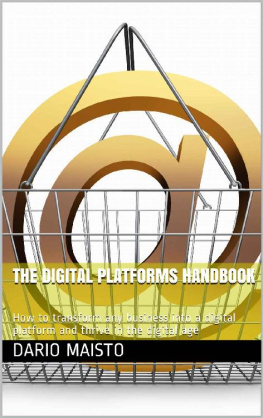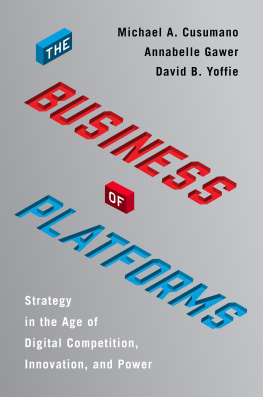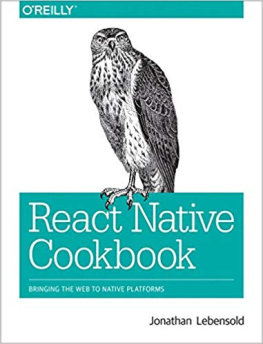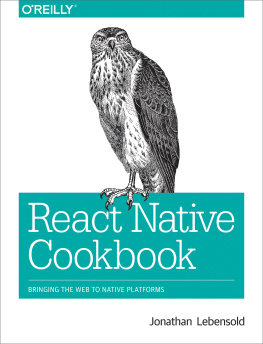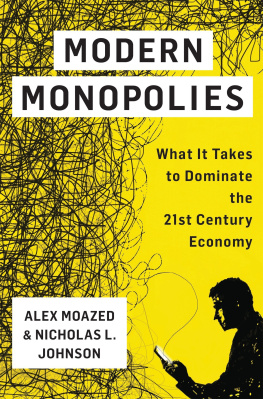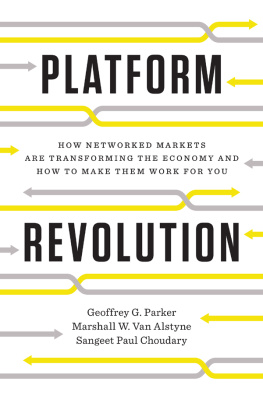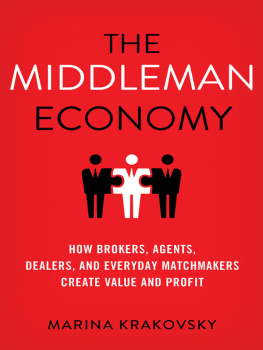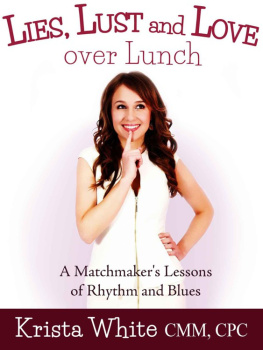Table of Contents
Praise for Matchmakers
David Evans and Richard Schmalensee are masters at combining strategic analysis and economic theory. Matchmakers is a journey through the strategies of platform businesses, which are central to our economies. Full of stories, fun to read, stimulating, and rigorous, this terrific book is required reading, from the economics and MBA student to the entrepreneur looking at building a platform to any reader curious about how our economy evolves.
JEAN TIROLE, Chairman, Toulouse School of Economics; Winner, 2014 Nobel Prize in Economic Sciences
Matchmakers will be mandatory for anyone building or investing in multisided platformsin the cloud or on the ground. Its not only full of great stories like the rise of M-PESA, its also a practical guide to getting your platform business off the ground. If the people behind Apple Pay had this book to read, maybe they would have started differently.
BOB SOLOMON, former Senior Vice President, Network and Financial Solutions, Ariba, Inc.
This book provided me, as a cofounder of the International Securities Exchange, with a different lens through which to view my business and industry. This framework would have been a valuable addition to my playbook as my colleagues and I grappled with questions of pricing and building critical mass when we were planning the launch, eighteen years ago, of the first all-electronic options exchange in the United States.
GARY KATZ, President and CEO, International Securities Exchange
The matchmaker is one of the oldest business models, but its ever more important in todays interconnected, networked world. This deep dive into todays multisided businesses provides a clear, compelling, and entertaining road map for how net platform businesses can blast off and ignite. Bravo!
CATHY BARON TAMRAZ, Chairman and CEO, Business Wire
Praise for Catalyst Code
an important book for anyone interested in understanding how breakthrough businesses can be built in todays economy.
BILL GATES
Catalyst Code shows that in the Internet Age, the greatest business successes will be based on creating communities in which buyers and sellers are brought together efficiently, rather than making a new product or providing a new service.
PATRICK MCGOVERN, founder and former Chairman, International Data Group
Evans and Schmalensee reveal the inner workings of what is rapidly becoming a new model for businesses.
PETER S. LYNCH, Vice Chairman, Fidelity Management & Research Company
Matchmakers
David S. Evans and Richard Schmalensee
Matchmakers
HARVARD BUSINESS REVIEW PRESS
Boston, Massachusetts
HBR Press Quantity Sales Discounts
Harvard Business Review Press titles are available at significant quantity discounts when purchased in bulk for client gifts, sales promotions, and premiums. Special editions, including books with corporate logos, customized covers, and letters from the company or CEO printed in the front matter, as well as excerpts of existing books, can also be created in large quantities for special needs.
For details and discount information for both print and ebook formats, contact .
Copyright 2016 David S. Evans and Richard Schmalensee
All rights reserved
No part of this publication may be reproduced, stored in or introduced into a retrieval system, or transmitted, in any form, or by any means (electronic, mechanical, photocopying, recording, or otherwise), without the prior permission of the publisher. Requests for permission should be directed to , or mailed to Permissions, Harvard Business School Publishing, 60 Harvard Way, Boston, Massachusetts 02163.
The web addresses referenced in this book were live and correct at the time of the books publication but may be subject to change.
Library of Congress Cataloging-in-Publication Data
Names: Evans, David S. (David Sparks), 1954- author. | Schmalensee, Richard, author.
Title: Matchmakers : the new economics of platform businesses : how one of the oldest business models on earth powers the most incredible companies in the world / David S. Evans and Richard Schmalensee.
Description: Boston, Massachusetts : Harvard Business Review Press, [2016]
Identifiers: LCCN 2015046357 | ISBN 9781633691728 (alk. paper)
Subjects: LCSH: Multi-sided platform businesses.
Classification: LCC HD9999.M782 E93 2016 | DDC 338.7dc23 LC record available at http://lccn.loc.gov/2015046357
ISBN: 9781633691728
eISBN: 9781633691735
To all the pioneers
who tried to cross the critical mass frontier.
Contents
M ANY OF THE BIGGEST COMPANIES IN THE WORLD, INCLUD ing Alibaba, Apple, Facebook, Google, Microsoft, News Corp., Rakuten, Tencent, and Visa, are matchmakers. So are many of the most exciting and valuable start-ups, such as Airbnb, BlaBlaCar, Didi Kuaidi, Flipkart, Lending Club, Pinterest, Spotify, and Uber. What these businesses have in common is that they all connect members of one group, like people looking for a ride, with another group, like drivers looking for passengers.
Matchmakers are very different from the businesses that have been the staple of college economics classrooms and MBA lectures for decades. They operate under a different set of economic rules. Traditional manufacturing businesses, for instance, buy raw materials, make stuff, and sell that stuff to customers. But matchmakers raw materials are the different groups of customers that they help bring together, not anything that they buy at all. And part of the stuff they sell to members of each group is access to members of the other groups. All of them operate physical or virtual places where members of these different groups get together. For this reason, they are often called multisided platforms. Theyre places where all of these different groups can meet.
If youve ever taken an economics course, you have heard a lecture on how traditional firms manage their production and set their prices to maximize profits. When it comes to matchmakers, that lecture was dead wrong, in critically important ways. Thats because the classic economic models dont account for the fact that the demand by each group of customers served by a matchmaker depends on the demand by other groups of customers it also serves. For instance, the American Express card connects consumers and merchants; consumer demand for the card depends on how many merchants have decided to accept it, and merchants demand in turn depends on how many consumers have decided to use the card. Lets be clear: ignoring the interdependence of matchmakers demands was a big mistake. Economic textbooks and business school courses made claims that just didnt apply to a large and growing part of the economy and, if followed, would have led matchmakers into bankruptcy if they were able to even get off the ground in the first place.



